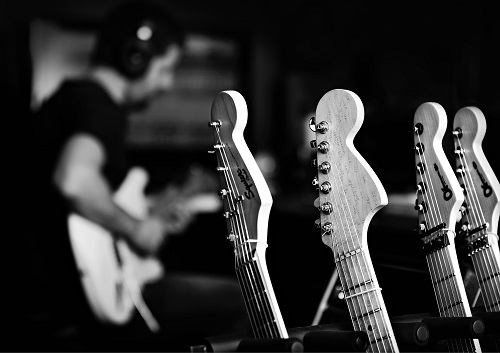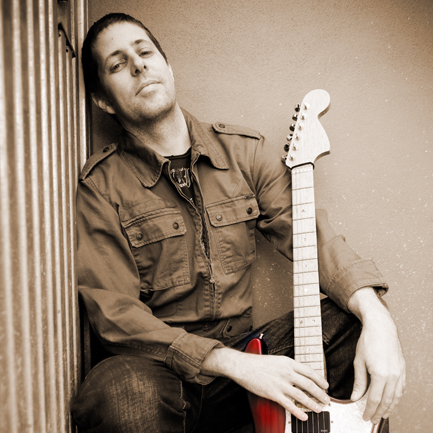27 Jan Meet Bill Palmer: Media Composer & Music Educator
Melodie’s Craig Hodges had a chat with composer Bill Palmer about his career in music, key influences & the composition process.
The Interview
Melodie: Hey Bill, thanks for taking the time to chat with us! What have you working on lately?
Bill Palmer: Well apart from composing for Melodie, I run an online RTO (Registered Training Organisation) called Australian Online Music Institute. We’ve been running for five years and we offer Cert. III, IV and Diploma programs to students all around Australia. I’m currently in the process of writing an Advanced Diploma program with a specific focus on composing for media. As you can imagine, that takes up a lot of my time.
Apart from that, I just finished up doing the music and recording voice-overs for a big Adelaide medical company’s phone system (Radiology SA) along with creating and compiling sound effects for an independent Ken Burns style documentary about an early 1900’s Australian explorer named Hubert Wilkins.

Sounds like you’re definitely keeping busy! How did you first get started in music?
Long story there. I had what you might call a “colourful childhood” and at 14 years old, ended up living with a church minister and his family. He could see I had some emotional issues that I was struggling with that I didn’t want to talk about. He suggested I pick up a guitar as a way of channelling my energy into something positive. It definitely worked and I found myself using music as an escape. It became something I slowly got good at, and at a young age I decided it was something I wanted to pursue in the hopes of sharing my gift with others.
What was the first album you bought?
In high school, my friends would copy cassette tapes of rock bands for me such as Def Leppard, Guns and Roses, The Police and many others. However, the first album I actually purchased was Eric Clapton’s Unplugged on CD.
Classics! When did you first start writing music for picture?
I got tapped on the shoulder to compose a piece for a documentary way back in 2007. To be honest, I really had no idea what I was doing at that stage and I had a minimal recording rig consisting of an MBOX, Pro Tools LE version 6 and an unsupported Windows laptop. The director wanted an acoustic “sound-a-like” type song which I spent a considerable amount of time on. After submitting the finalised version, my song never actually got used in the documentary. In hindsight, it was a great introduction to the cut and thrust of the industry.
Later, I began working in tertiary education (in my early 30’s) and was required to teach a series of units on composing music for film. As the saying goes, the ultimate form of learning is teaching, and in many ways, I was getting paid to learn. It was during this time I was forced to explore the medium on a much deeper level and began to appreciate the incredible diversity composing for media offers.

Can you take us through your writing process?
I almost always start with some kind of melodic or harmonic “idea.” It might be a chord progression, a simple melody or a combination of both. Once I’ve found an idea that I feel has merit, I’ll start fleshing it out by adding complementary parts and building the initial idea into something more substantial. I’ll often use melodic permutations (retrograde, inversion etc.) to help come up with variations on initial ideas.
Once I have a strong “section” (i.e., a verse or an A section) I’ll then work on developing at least two other definable sections in the piece. I try and incorporate repetition, variation and contrast so that the listener is engaged in a musical conversation. Like any conversation, you’ve also got to know when it’s time to wrap things up and so, having a strong ending is another thing I’m also conscious of.
Lastly, I don’t use templates. I believe that a strong musical idea will intuitively guide you where it needs to go. However, you have to listen and be patient. If you are across your composing rig, you’ll know what it takes to get it there.
What DAW do you use?
For composing I use Logic Pro. As I use a Mac, it makes the most sense and the interface is very intuitive. For finals I’ve been using Pro Tools. However, I recently switched to Nuendo as I also do post production work and the “vanilla” version of Pro Tools caps out at 128 tracks. Nuendo also has some fantastic metering and LUFS settings that make finals a breeze.
Great tips! And what keeps you busy outside of music?
I enjoy fitness and have a “garage gym” on my farm. My wife and I also like to get away from the computers on the weekend and so we do long distance hikes, kayaking and other outdoors type stuff. Our goal is to thru-hike the Pacific Crest Trail (PCT) in the USA someday.
Favourite band/artist and why?
That’s a tough one. I tend to pull my influences from all over the place, depending on where I’m at and what I’m going for at the time. However, if I’m listening to music purely for enjoyment, it’s almost always jazz-based material such as John Scofield. I tend toward artists who show a diversity of styles and don’t just do the same thing over and over. Scofield’s Uberjam series of albums is really interesting as it incorporates looping, electronica and interesting harmonic ideas throughout.
Favourite track of yours in the Melodie library and why?
A recent track I composed called Umbra came together very quickly, while I was under a tight deadline. I had composed four hybrid orchestral pieces for a brief and needed a fifth to meet the quota.
I only had a day to get it done and I remember waking up thinking, geez I hope I can pull off a complete tune before dinner. Thankfully, it all came together. Little victories and moments like this can be really encouraging as a composer.
Thanks again Bill!
Thanks guys, anytime!


